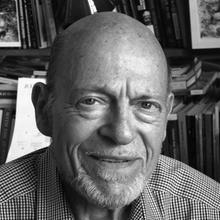 |
|
| Richard Howard | |
Richard Howard, a Pulitzer Prize-winning poet "who made the venerable genre of the dramatic monologue speak in a modern voice, and whose translations brought the work of Roland Barthes, Alain Robbe-Grillet and dozens of other French writers to an Anglophone audience," died March 31, the New York Times reported. He was 92.
Howard's "intellectually finespun verse, replete with abstruse historical references, often addressed the reader directly as 'you' in words spoken by characters as various as Sir Walter Scott, John Ruskin and Edith Wharton," the Times wrote. "In his hands, a verse style most closely associated with Robert Browning re-emerged as a surprisingly nimble vehicle, allowing Mr. Howard to weave his way through a welter of poetic subjects."
His Pulitzer was awarded in 1970 for Untitled Subjects, which "presented 15 dramatic monologues spoken by Victorians and Edwardians both eminent (Sir Walter Scott) and obscure (a secretary to William Gladstone, the British prime minister)." Howard's other books include Two-Part Inventions; Talking Cures; Inner Voices: Selected Poems, 1963-2003; Misgivings; Lining Up; Trappings; Fallacies of Wonder; and The Silent Treatment. His last published collection was A Progressive Education in 2014.
After translating two volumes of Charles de Gaulle's war memoirs, published in 1959 and 1960, Howard "introduced a pantheon's worth of French writers into English," and his rendition of the complete Fleurs du Mal by Baudelaire won the American Book Award (now National Book Award) in translation in 1983. His reputation "was bolstered by his translations and critical essays. Simultaneously with Untitled Subjects, a wide-ranging collection of his criticism appeared, Alone with America: The Art of Poetry in the United States Since 1950," the Times noted. A second volume of criticism, Paper Trail: Selected Prose 1965-2003, was published in 2004.
In 1970, he joined the publishing house George Braziller as editor of its series Braziller Poets, where he advanced the careers of several younger poets, including Frank Bidart, Cynthia MacDonald, Charles Simic and J.D. McClatchy. He was the poet laureate of New York State from 1993 to 1995, and at various times the poetry editor of The Paris Review and Western Humanities Review. After teaching English at the University of Houston for 10 years, he became professor of writing at Columbia in 1997.
"He's always throwing his voice, and therefore distracting you the way a magician does, from something that is driving him," poet Edward Hirsch told the Washington Post, noting that Howard had grown up gay in the constricted milieu of 1940s Ohio. "It's possible to be dazzled by the literary encyclopedia coming to life and to miss the fact that these poems are driven by personal experience, by a need to disguise yourself and reveal yourself."
From Howard's poem "209 Canal":
Not hell but a street, not
Death but a fruit-stand, not
Devils just hungry devils
Simply standing around the stoops, the stoops.

